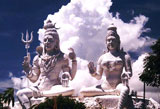|
Link Back To Home Page
Link Back To Hindu Festivals



Ishwar Satya Hai Satya Hi Shiv Hai,
Shiv Ji Bihaane Chale
hey Shiv pita parmaatmaa
Hey Shiv Shankar Bhole Baba
Bholenath se niraalaa Gaurinath se
Shiv Naam Jaap
Maha Shivaratri is celebrated throughout the country on the 13th (or 14th) day of the dark half of 'Phalgun' month in the
Hindu Calendar which falls around February or March. The name means "the night of Shiva". The ceremonies take place
chiefly at night. This is a festival observed in honour of Lord Shiva and it is believed that on this day Lord Shiva was married
to Parvati.
The Hindu Trinity has Lord Brahma, the creator, Lord Vishnu, the preserver and Lord Shiva or Mahesh, the Destroyer and
Re-creator of life. Shiva is known by many names like "Shankar", "Mahesh", "Bholenath", "Neelakanth",
"Shambhu Kailasheshwar", "Umanath", "Nataraj" and others.
He is the most sought-after deity amongst the Hindus and they pray to him as the god of immense large-heartedness who
they believe grants all their wishes. Many interesting stories are written about him that reveal His magnanimous heart. Not
only this, but these stories and legends also enrich the Indian culture and art.
Time is invisible and formless. Therefore Mahakaal Shiva, as per the Vedas, manifested himself as "LINGUM" to
make mankind aware of the presence of Eternal Time. That day when Shiva manifested himself in the form of "Lingum"
was the fourth day of the dark night in the month of 'Maagha which usually falls around March.
The Festivity:
People observe a strict fast on this day. Some devotees do not even drink a drop of water. The Shiva Lingam is worshipped
throughout the night by washing it with milk, curd, honey, rose water, etc. while chanting the Mantra "Om Namah Shivaya".
Offerings of Bael leaves are made to the Lingam as Bael leaves are considered very sacred. Hymns in praise of Lord Shiva,
such as the "Shiva Mahimna Stotra" or "Shiva Tandava Stotra" are sung and people repeat the 'Panchakshara'
Mantra, "Om Namah Shivaya". It is believed that whoever utters the names of Shiva during Shivratri, with perfect
devotion and concentration, is freed from all sins, reaches the abode of Shiva and lives there happily. He is liberated from
the recurring wheel of birth and death .
|

